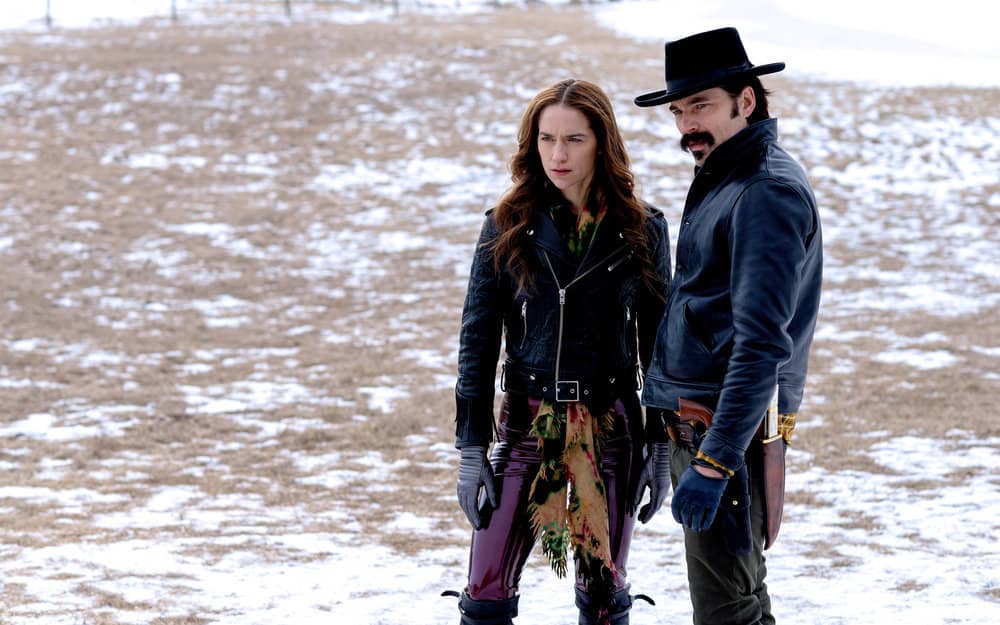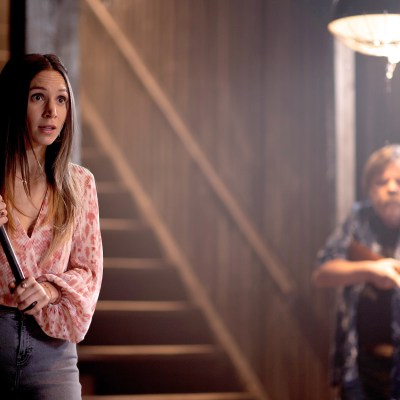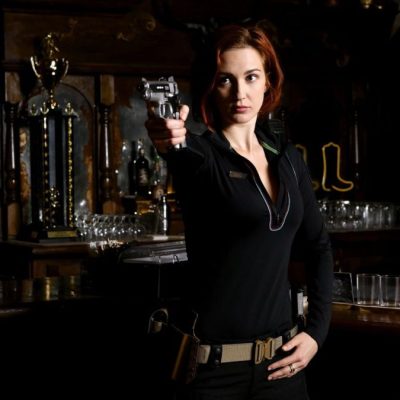The following contains spoilers for Wynonna Earp season 4.
While we wait for Wynonna Earp to return from its COVID-instigated midseason hiatus, it seems like the perfect time to dig into one of the show’s most complicated and rich topics: The layered relationship between Wynonna Earp and Doc Holliday, and the ways in which the show has committed to telling a love story that goes beyond whether a particular pairing will get together in the end.
Far too many TV series – genre or otherwise – waste far too much screen time delaying the organic progression of their two leads’ romantic relationship. As a result, from pilot to series finale, the redundant “will they/won’t they” relationship question dominates a significant portion of the plot, as marquee couples are inevitably pulled together and pushed apart by circumstance, and the story spins its wheels, afraid to let the would-be couple take “the next step,” usually right up until the series’ final set of episodes.
This happens so often that there’s even a name for it – it’s known as the Moonlighting Curse. The name references the (honestly, incredibly incorrect) assumption that the 1980s comedy-drama Moonlighting suddenly became both boring and bad because it finally paired off its will they/won’t they leads, played by Bruce Willis and Cybill Shepherd after years of mining the sexual tension between the pair.
Though the true culprit was actually bad writing, the show’s subsequent collapse in terms of both ratings and quality was ultimately blamed by many network higher-ups on the decision to finally pay off the series’ love story well before the end of the show (the characters consummated their relationship at the end of Season 3, and the series ran for two more seasons). And in the many years since, something of a cottage industry of shows has sprung up that seem to exist solely to string along the fans who invest in romance, creating an endless stream of obstacles for their marquee pairings centered around the questions of whether they will “get together” yet afraid to fully confront the idea of what writing a real, complicated relationship might look like.
Thankfully, Wynonna Earp has never been the sort of show that’s afraid of anything.
Read more
In the world of this series, the question of whether Wynonna and Doc love one another isn’t really even worth asking anymore. It’s just a simple fact. Through fights and betrayals, trips to hell, the Garden of Eden, and back again, one of the only true constants of Wynonna Earp has been that, no matter what, Doc and Wynonna are in love.
Even when one – or both – of them was romantically involved (or at least sleeping with) other people for whatever reason, their epic attachment was always bubbling in the background. Everyone in Purgatory knows what this pair means to one another, even when both have done their best to avoid the reality. Granted, neither of them is a particularly easy person to be in a relationship with, which is perhaps why they keep failing to truly get together in a lasting, healthy way despite the complete obviousness of their feelings for one another. And man is it fun to watch, proof that the “will they/won’t they” narrative structure isn’t the only or even best way to tell a love story.
Yes, the two often appear chronically incapable of even really admitting – let alone realistically talking about – their feelings for one another. But Wynonna Earp smartly doesn’t pretend those emotions don’t exist, or that they’re not driving the behavior of both characters. Instead, the show allows their relationship to become a primary driving force of the plot. The fact of their love for one another is not only taken as read, it’s used as a tool by which to further explore who they both are as individuals, in a way that will ultimately allow them to be better both for and with one another.
Both Wynonna and Doc are deeply broken people, who’ve suffered unimaginable loss and pain in their lives. Mutually riddled with trust issues, neither seems to believe they will ever find anything as normal as peace, or that they’re worthy of those they care about most. This low-key self-loathing leads both to make selfish decisions and bad choices, the kind that generally end up hurting themselves more often than they end up helping anyone else.
Because of this, Wynonna tries to drive Doc away, convinced that she doesn’t deserve real love. For his part, Doc behaves recklessly, attempting to prove he’s the monster he’s always feared becoming. (Even allowing himself to be turned into a literal monster at one point.) They argue, they make choices the other doesn’t agree with, they purposefully hurt one another when they’re angry, and they push each other away.
Yet, at no point is any of this behavior meant to make viewers wonder about the reality of their feelings for one another or whether they’ll ultimately be together or not. (No television show is ever going to abandon a couple with this kind of sexual chemistry, and we all know it.) Instead, the issues in their romance are meant to illuminate the things that Wynonna and Doc struggle with individually, and every step they each take toward figuring themselves out is also presented as a step (back) toward one another.
If that’s not incredibly romantic, I’m not sure what is.
Often, the duo have what once again feels like cosmically unfortunate timing – we’re talking like John-and-Aeryn-on-Farscape levels of bad – in which neither of them can seem to get on the same page at the same time. Season 4 is the most heartrending example of this, as their fragile reconnection is shattered when Wynonna decides to shoot Holt Clanton in the back rather than trust the tenuous peace Doc negotiates between their families.
But – again, also like the central love story of Farscape – Wynonna Earp doesn’t act as though these issues are insurmountable, or a potential death knell for the pair fans love. In fact, despite the difficulties the two are sure to face next season, it feels equally obvious that they’ll still find their way back together and work things out in the end. But only once they deal with some of their own issues first. Because I mean, let’s be real, if Doc literally becoming a vampire didn’t faze these two for longer than a handful of episodes, this isn’t likely to do so either.
Yet, the latest rift between the two still makes for supremely compelling television – not because it overtly threatens their love, but because it stems from interior character issues that have nothing to do with their relationship and that can’t be healed by a romance. Whether these two want to be together isn’t the issue here – they clearly do – it’s whether they can be right now in light of the choices they’ve both made that have nothing to do with their feelings for each other.
Wynonna’s reasons for deciding to kill Holt are understandable – if perhaps decidedly unheroic – as is Doc’s conviction that her choice is not only cowardly but will surely escalate the same blood feud that he himself now regrets starting back in Tombstone. But despite the fact that the midseason finale ends with both characters moving away from one another, physically and emotionally speaking, both are still on similar narrative journeys, questioning who they are if their previously established identities as the Earp heir and the fastest gunslinger in the West no longer apply.
Wynonna and Doc’s relationship has taken something of a backseat in Season 4 thus far, allowing Wynonna Earp to center WayHaught’s story and explore Nicole’s lingering trauma from the eighteen months in which she had to survive in Purgatory on her own. But the pairing still feels as necessary and relevant to the story the show is telling as they ever have been. And, despite their current situation, it seems more obvious than ever that their paths will ultimately not only lead back to one another but to better versions of them both. This isn’t a will they/won’t they question so much as a matter of how and when.
Wyndoc is the grand and (thus far) tragic love story of the Ghost River Triangle, a star-crossed pair who share a child, a complicated family entanglement going back hundreds of years, and a love of continual self-sacrifice in the name of others. (And also, they hunt demons!) But Wynonna Earp isn’t content to simply throw up unnecessary narrative obstacles in their path for the sake of dragging out a happily ever after. Instead, the show acknowledges Doc and Wynonna’s obvious feelings, while simultaneously asking why they can apparently do anything together but figure out how to love one another the way they both deserve.
This sort of romantic introspection – and acknowledgment that love really doesn’t instantly conquer all – is an important and often ignored part of a couple’s story, and can be just as compelling as the will they/won’t they dance that many other pairings before Wyndoc have been forced to engage in. It takes work – on yourself and on your relationship – to build something that really lasts, and Wynonna Earp’s decision to show us that that can be something really ugly and uncomfortable is as important as the happily ever after part we fantasize about. Wynonna and Doc will absolutely find their way back together again – but this time they’ll be stronger for it when they do.


